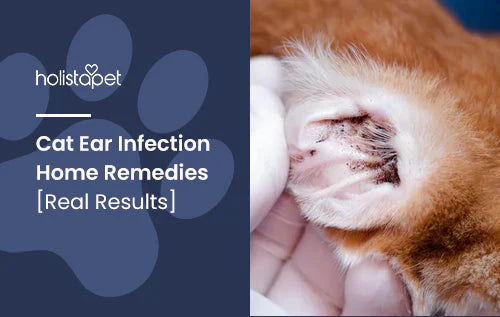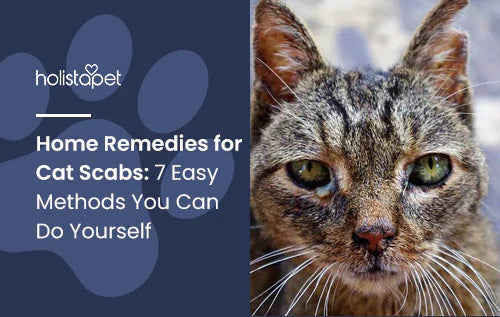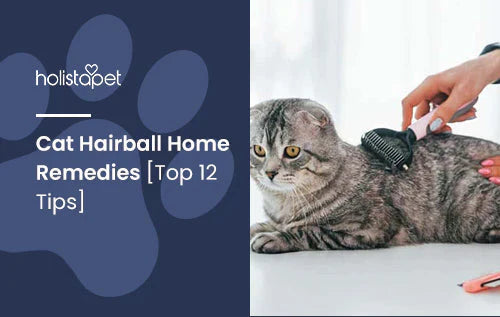Ear infections are nasty. Your cat is so dependent on its ears for mobility and navigation that an ear infection for them is much worse than a painful ear infection for us. These infections can be caused by a number of different factors, and more often than not, an ear infection is a secondary ailment. Because cat ear infections are very common, there are several home remedies to help owners combat the issue.
Before you apply any home remedies for your cat's ear infection, make sure to speak with your vet first. It would be best to catch any other ailment before the issues get any worse. If there is excessive blood or discharge, skip the home remedy, and take your pet straight to the vet. For less severe cases, it may be safe to treat your pet at home. Before we get into home remedies for ear infections in cats, let's fully explore what one is.
What is a Cat Ear Infection?
Just like us, felines can be plagued with an ear infection. This is never fun and can mess with your pet's ability to hear. Certain chronic ear infections can be painful and also cause a loss of balance because the ear is crucial to the body's ability to navigate. There are several causes for an ear infection, but kittens and outdoor cats are more prone to get them. This is because kittens have a weaker immune system and outdoor cats are exposed to more parasites, especially if they love to hunt.
An ear infection is the inflammation of the inner, middle, or outer ear, often caused by contamination. External ear infections are called otitis externa, and middle and outer ear infection infections are called otitis media. In felines, the most prevalent cause of ear infections is mites. In fact, they are responsible for just over half of all ear infections in cats. An ear infection can be the main issue, but more often than not it's a sign of another medical ailment. Allergies and foreign objects lodged in the ear canal are responsible for many ear infections in cats as well.

Common Causes of Ear Infection in Cats
Ear infections in cats can arise from various factors that disrupt the normal environment of the ear canal, leading to bacterial or yeast overgrowth. Understanding these causes is crucial for prevention and treatment.
- Ear Mites: These tiny parasites are a common cause of ear infections, especially in kittens. They cause intense itching and inflammation.
- Allergies: Cats with allergies to food, pollen, or other environmental factors are more prone to ear infections due to inflammation and excess wax production.
- Moisture: Excessive moisture in the ear canal can create a favorable environment for bacteria and yeast to grow, often seen after bathing or swimming.
- Foreign Bodies: Objects like grass seeds or dirt can become lodged in the ear canal, causing irritation and infection.
- Underlying Health Conditions: Diseases such as diabetes or immune disorders can predispose cats to recurrent ear infections.
- Trauma or Injury: Scratches, bites, or other injuries to the ear can introduce bacteria, leading to infection.
- Wax Buildup: Excessive earwax can trap bacteria and yeast, promoting infection.
Other than ear mites, these are some of the most common causes of ear infections in cats:
- Allergies
- Foreign objects such as mulch or grass
- Yeast or bacteria overgrowth
- Polyps in the ear canal
- Excessive wax
- Ruptured eardrum
- Overgrown hair in the ear canal
- Autoimmune diseases
Related Article: The Best Home Remedies for Ear Mites in Cats [Easy Tips]
Symptoms of Ear Infection in Cats
When felines have an ear infection, it won't be subtle. The signs are usually easy to spot. Your cat will paw and scratch at its ears, and may even shake the head or tilt in discomfort. Please remember that ear infections are typically a secondary condition. For instance, an autoimmune disease will weaken your pet's immunity and cause several different infections at once. Depending on the severity of the infection, symptoms may include:
- Redness or swelling: Inflammation in the ear canal or ear flap.
- Discharge that is yellow, black, or resembles coffee grounds: This could indicate the presence of ear mites or a bacterial or fungal infection.
- Excessive Wax: A buildup of wax in the ear canal can be a sign of infection.
- Strong Odor: An unusual smell coming from your cat's ear often indicates an infection.
- Loss of hearing or balance: Inner ear infections can affect your cat's hearing and balance, leading to disorientation or stumbling.

Prevention of Cat Ear Infection
Preventing your cat from getting an ear infection is difficult. Because there are so many causes, trying to guard against all of them is nearly impossible. However, the cat ear mite is the most common cause of ear debris, and there are effective methods to prevent infestation. It is important to keep your pet on a monthly check-up schedule with the vet. Also, clean bedding and pillows that your pet comes into constant contact with weekly.
Check your cat's outer ear and ear canal daily for irritation, redness, debris, residue, and odor. A pale pink color is normal as long as there is no odor or residue. There are many sprays available for sale at pet stores to help combat allergies and other irritants in the air that cause dryness or itchiness in infected ear. Although you may be encouraged to clean the inside of your cat's ear with a q-tip, do not. Unless instructed by a vet, never put any solid objects into your cat's ear.
Related Article: What Can I Give My Cat For Pain Relief?
Home Remedies for Ear Infection in Cats
Owners must be careful when treating their cat for ear infections. Remember never to insert anything harmful into the ear; you may puncture an eardrum. Many times, an infestation of ear mites left untreated, can cause other issues within the ear. So even after the mites are gone, and infection may persist.
Ear Miticides
There are several over-the-counter ear miticides for sale at pet stores. This is the treatment owners tend to flock to most. Follow the directions on the bottle for application. Most of these ear drops require weekly use but continue to apply ear medication until you see the symptoms subside. If the symptoms are not going away, please see a vet.
Olive Oil
Olive oil is also known as a great home remedy to clean out ear mites and debris. Please speak with your vet before using olive oil in your cats' ears. Owners can put two or three drops on the ear and then massage up from the base of the ear to the tip. This can help clean out debris and mites. Use a cloth to wipe anything pushed up from the tips of the cat's ears. Never insert the cloth into the ear canal.
Apple Cider Vinegar
A mix of 50% water and 50% apple cider vinegar can be useful to combat yeast and bacteria infections. This is another popular treatment amongst owners. Never directly pour apple cider vinegar into your cat's outer ear canal. Soak a cotton swab in the solution and press the soaking swab gently to the tips and outer ear lobe, allowing the solution to drip down into the ear slowly.

Yellow Dock Root
Yellow dock root has been praised for decades for its anti-inflammatory properties, making it a beneficial home remedy for painful ear infections in cats. To use, dilute the extract of yellow dock root in water—five drops to one tablespoon of water is ideal. Soak a cotton swab in the solution and apply it to the tips and upper ear, allowing the mix to slowly work its way down the inner ear. This natural remedy can help in the healing process, especially in cases of middle ear infections, but be cautious never to insert the swab into the ear canal directly.
Coconut Oil
Much like olive oil, coconut oil can be used to clean the ears. Owners can put a pinch of garlic powder in a tablespoon of coconut oil to help repel parasites. Soak a cotton ball in the mix and press the ball against the ear so that the mixture seeps out slowly. Owners can then massage the ear upwards from the base to help dislodge foreign objects or clear debris.
CBD (Cannabidiol)
Although CBD is not an actual cure for ear mites, it may provide relief from the itch and discomfort that accompanies ear infections. At Holistapet, we offer many natural remedies and a large variety of CBD for cats options located here. If your cat has a bothersome ear infection you can make use of these home remedies and also provide your dog with some CBD to make the healing process more tolerable.
Final Thoughts - Cat Ear Infection Home Remedies
You never want to see your pet suffer, and an ear infection can be very irritating and painful. It can be caused by various factors, including cat ear mites, foreign objects lodged in the ear, allergies, yeast or bacteria buildup, and excessive wax. Luckily, there are several home remedies for ear infections in cats.
Owners should always go speak with a vet before starting a home treatment for ear infections. This is because there can be a much more serious issue causing the infection, and it's best to alleviate that to stop the symptoms. Make sure to keep your home clean and wash your cat's bedding areas weekly. Daily looks inside your pet's ear are highly recommended as well. It may be impossible to stop ear infections but with the proper knowledge and procedure, it can be an easy issue to solve.


 CBD Oil for Cats - Fast Acting
CBD Oil for Cats - Fast Acting
 CBD Cat Treats - Easy Dose
CBD Cat Treats - Easy Dose
 CBD Calming Chews for Cats - Highly Rated
CBD Calming Chews for Cats - Highly Rated
 CBG Oil for Dogs and Cats - Loved by Thousands
CBG Oil for Dogs and Cats - Loved by Thousands





1 comment
Karen McCoskey
I’ve tried everything vinegar cat medicine, someone suggested garlic, so I warmed up some garlic let it cool down I put it in my cat’s ear and he seems to be feeling better. I’m just saying I live in assisted living have no extra money at all my cat and his sister live with me you’re 16 years old they are my friends and my family
Leave a comment
All comments are moderated before being published.
This site is protected by hCaptcha and the hCaptcha Privacy Policy and Terms of Service apply.